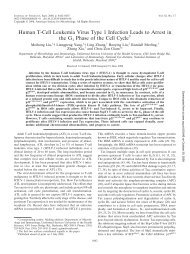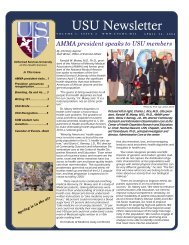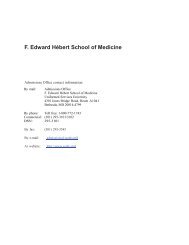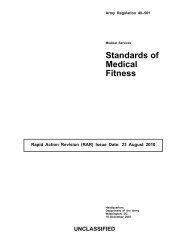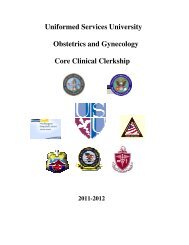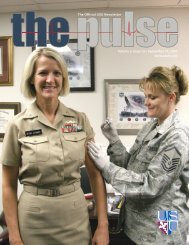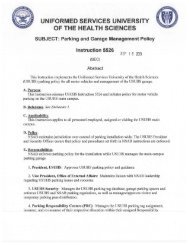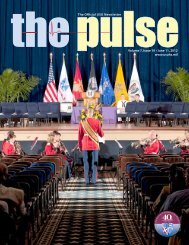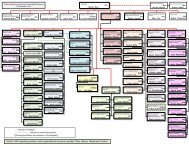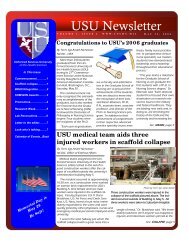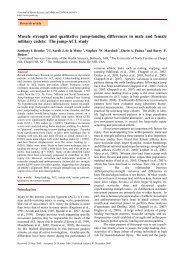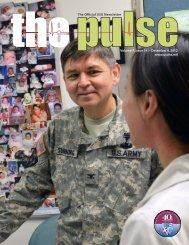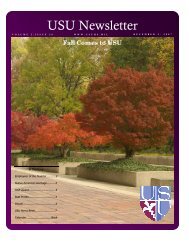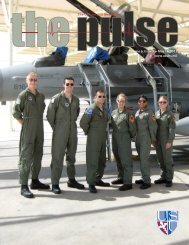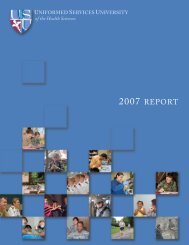2012 Annual Report - Uniformed Services University of the Health ...
2012 Annual Report - Uniformed Services University of the Health ...
2012 Annual Report - Uniformed Services University of the Health ...
You also want an ePaper? Increase the reach of your titles
YUMPU automatically turns print PDFs into web optimized ePapers that Google loves.
<strong>Uniformed</strong> <strong>Services</strong> <strong>University</strong> <strong>of</strong> <strong>the</strong> <strong>Health</strong> Sciences<br />
Leading Scientific Growth<br />
A team <strong>of</strong> USU-led scientists recently<br />
reported a major breakthrough in<br />
<strong>the</strong> development <strong>of</strong> a highly effective<br />
vaccine against <strong>the</strong> deadly Nipah virus.<br />
Nipah and Hendra viruses, found<br />
naturally in several species <strong>of</strong> Pteropid<br />
fruit bats (flying foxes), emerged in <strong>the</strong><br />
1990s causing serious disease outbreaks<br />
in humans and livestock in Australia,<br />
Bangladesh, India, Malaysia and<br />
Singapore. Recent Nipah outbreaks have<br />
resulted in acute respiratory distress<br />
syndrome and encephalitis, person-toperson<br />
transmission, and greater than<br />
75 percent case fatality rates among<br />
humans. The NIH and Centers for<br />
Disease Control and Prevention have<br />
classified Nipah and Hendra as biothreat<br />
agents, and <strong>the</strong> U.S. Department <strong>of</strong><br />
Agriculture has characterized <strong>the</strong>m as<br />
agriculture threat agents.<br />
Experiments carried out in African<br />
green monkeys demonstrated that<br />
immunizing monkeys with a vaccine<br />
based on <strong>the</strong> Hendra virus attachment<br />
G glycoprotein afforded complete<br />
protection against Nipah virus infection<br />
with no evidence <strong>of</strong> disease.<br />
“These findings are really quite<br />
promising and appear to <strong>of</strong>fer a real<br />
potential treatment for ei<strong>the</strong>r Nipah or<br />
Hendra virus infection in people,” said<br />
Christopher Broder, Ph.D., pr<strong>of</strong>essor<br />
<strong>of</strong> Microbiology at USU and <strong>the</strong> study’s<br />
corresponding author.<br />
Lead author, Katharine Bossart, Ph.D., a<br />
USU alumna and assistant pr<strong>of</strong>essor in<br />
<strong>the</strong> Department <strong>of</strong> Microbiology, Boston<br />
<strong>University</strong> School <strong>of</strong> Medicine, developed<br />
<strong>the</strong> Hendra-sG vaccine while a student<br />
in Dr. Broder’s laboratory at USU. “Since<br />
<strong>the</strong> vaccine is only a recombinant piece <strong>of</strong><br />
<strong>the</strong> virus, it can be produced by itself and<br />
purified, and is a type <strong>of</strong> vaccine known<br />
as a subunit, thus making it extremely<br />
safe to use,” Bossart said.<br />
According to study co-author Thomas<br />
Geisbert, Ph.D., a USU alumnus,<br />
“This work now provides key<br />
evidence that a simple and<br />
safe recombinant vaccine<br />
against Nipah virus is possible.<br />
Demonstrating this in a<br />
nonhuman primate model is a<br />
major step forward in developing<br />
it for future <strong>the</strong>rapeutic<br />
use in people.”<br />
“There are currently no<br />
approved vaccines for prevention<br />
<strong>of</strong> infection and disease caused<br />
by Nipah and Hendra available for use<br />
on people or livestock,” Broder said.<br />
“The vaccine had previously shown<br />
protection in ferrets against Hendra<br />
virus infection, and in cats against<br />
Nipah virus infection. In addition, <strong>the</strong><br />
Hendra-sG vaccine has been trialed in<br />
horses against Hendra virus in Australia<br />
where it has demonstrated complete<br />
protection against illness and infection.<br />
Demonstrating its potential as a<br />
safe and effective vaccine in monkeys<br />
is an important step toward being<br />
licensed for possible use in people.”<br />
2010<br />
The Postgraduate Dental College is established at USU.<br />
21



